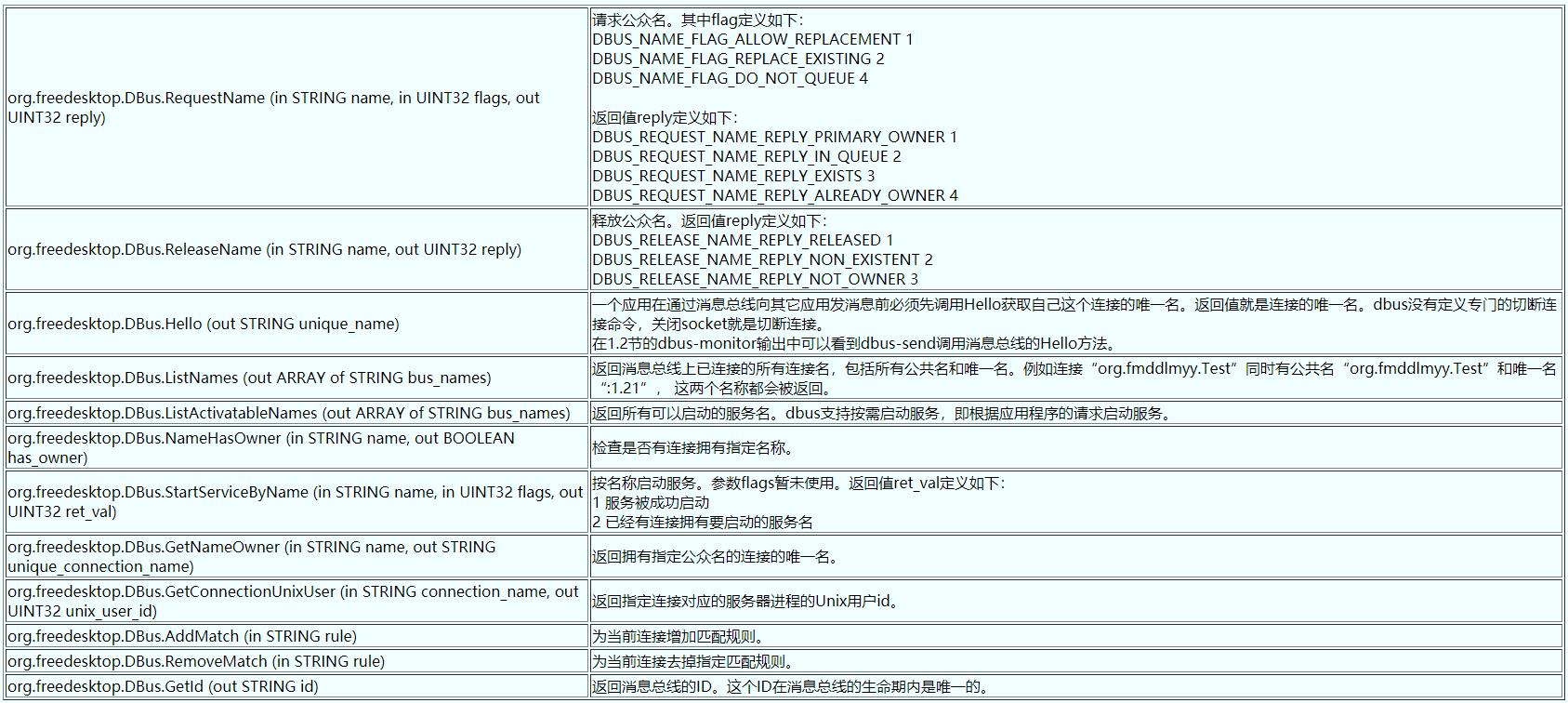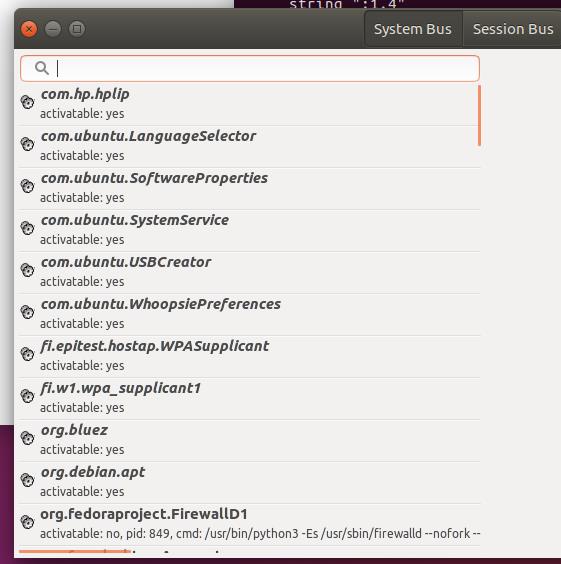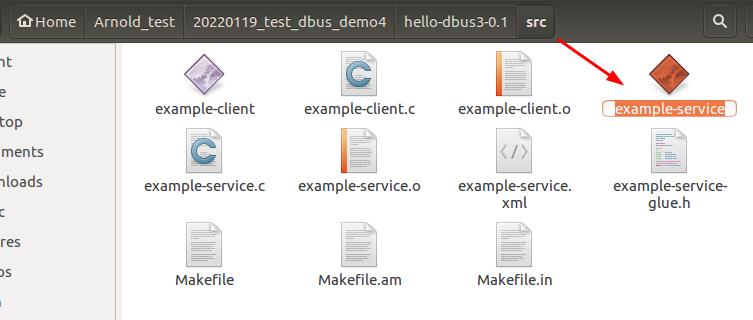linux 进程间通信 dbus-glib实例详解二(上) 消息和消息总线(附代码)
Posted Dontla
tags:
篇首语:本文由小常识网(cha138.com)小编为大家整理,主要介绍了linux 进程间通信 dbus-glib实例详解二(上) 消息和消息总线(附代码)相关的知识,希望对你有一定的参考价值。
linux 进程间通信 dbus-glib【实例】详解一(附代码)(d-feet工具使用)
linux 进程间通信 dbus-glib【实例】详解二(上) 消息和消息总线(附代码)
文章目录
dbus实例讲解(二上):消息和消息总线
应用程序A和消息总线连接,这个连接获取了一个众所周知的公共名(记作连接A)。应用程序A中有对象A1提供了接口I1,接口I1有方法M1。 应用程序B和消息总线连接,要求调用连接A上对象A1的接口I1的方法M1。
在上一讲的加法例子中,上面这段话可以实例化为:
应用程序example-service和会话总线连接。这个连接获取了一个众所周知的公共名“org.fmddlmyy.Test”。
应用程序example-servic中有对象“/TestObj”提供了接口“org.fmddlmyy.Test.Basic”,接口“org.fmddlmyy.Test.Basic”有方法“Add”。
应用程序d-feet和会话总线连接,要求调用连接“org.fmddlmyy.Test”上对象“/TestObj”的接口“org.fmddlmyy.Test.Basic”的方法“Add”。
应用程序B调用应用程序A的方法,其实就是应用程序B向应用程序A发送了一个类型为“method_call”的消息。 应用程序A通过一个类型为“method_return”的消息将返回值发给应用程序B。我们简单介绍一下D-Bus总线上的消息。
1、D-Bus的消息
上一讲说过最基本的D-Bus协议是一对一的通信协议。与直接使用socket不同,D-Bus是面向消息的协议。 D-Bus的所有功能都是通过在连接上流动的消息完成的。
1.1、消息类型
D-Bus有四种类型的消息:
- method_call 方法调用
- method_return 方法返回
- error 错误
- signal 信号
前面介绍的远程方法调用就用到了method_call和method_return消息。顾名思义,在发生错误时会产生error消息。 如果把method_call看作打电话,那么signal消息就是来电了。后面还会详细讨论。
1.2、dbus-send和dbus-monitor
dbus提供了两个小工具:dbus-send和dbus-monitor。我们可以用dbus-send发送消息。用dbus-monitor监视总线上流动的消息。 让我们通过dbus-send发送消息来调用前面的Add方法,这时dbus-send充当了应用程序B。用dbus-monitor观察调用过程中的消息。
启动example-service:
$ ./example-service
在另一个控制台启动dbus-monitor:
$ dbus-monitor
dbus-monitor默认监视会话总线。执行:
$ dbus-send --session --type=method_call --print-reply --dest=org.fmddlmyy.Test /TestObj org.fmddlmyy.Test.Basic.Add int32:100 int32:999
输出为:
method return time=1642572373.469364 sender=:1.124 -> destination=:1.135 serial=118 reply_serial=2
int32 1099
dbus-monitor的相关输出包括:
(我的ubuntu输出)

signal sender=org.freedesktop.DBus -> dest=(null destination) path=/org/freedesktop/DBus; interface=org.freedesktop.DBus; member=NameOwnerChanged
string ":1.22"
string ""
string ":1.22"
method call sender=:1.22 -> dest=org.freedesktop.DBus path=/org/freedesktop/DBus; interface=org.freedesktop.DBus; member=Hello
method call sender=:1.22 -> dest=org.fmddlmyy.Test path=/TestObj; interface=org.fmddlmyy.Test.Basic; member=Add
int32 100
int32 999
method return sender=:1.21 -> dest=:1.22 reply_serial=2
int32 1099
signal sender=org.freedesktop.DBus -> dest=(null destination) path=/org/freedesktop/DBus; interface=org.freedesktop.DBus; member=NameOwnerChanged
string ":1.22"
string ":1.22"
string ""
:1.22就是dbus-send在本次调用中与会话总线所建立连接的唯一名。:1.21是连接“org.fmddlmyy.Test”的唯一名。 在以上输出中我们可以看到:1.22向“org.fmddlmyy.Test”发送method_call消息,调用Add方法。 :1.21通过method_return消息将调用结果发回:1.22。其它输出信息会在以后说明。
dbus-send的详细用法可以参阅手册。调用远程方法的一般形式是:
$ dbus-send [--system | --session] --type=method_call --print-reply --dest=连接名 对象路径 接口名.方法名 参数类型:参数值 参数类型:参数值
dbus-send支持的参数类型包括:string, int32, uint32, double, byte, boolean。
2、消息总线(dbus-daemon?)的方法和信号
2.1、概述
消息总线(dbus-daemon?)是一个特殊的应用,它可以在与它连接的应用之间传递消息。 可以把消息总线看作一台路由器。正是通过消息总线,D-Bus才在一对一的通信协议基础上实现了多对一和一对多的通信。
消息总线虽然有特殊的转发功能,但消息总线也还是一个应用。 其它应用与消息总线的通信也是通过1.1节的基本消息类型完成的。作为一个应用,消息总线也提供了自己的接口,包括方法和信号。
我们可以通过向连接“org.freedesktop.DBus ”上对象“/”发送消息来调用消息总线提供的方法。 事实上,应用程序正是通过这些方法连接到消息总线上的其它应用,完成请求公共名等工作的。
2.2、清单
消息总线对象支持第一讲中提到的标准接口"org.freedesktop.DBus.Introspectable", 我们可以调用org.freedesktop.DBus.Introspectable.Introspect方法查看消息总线对象支持的接口。例如:
$ dbus-send --session --type=method_call --print-reply --dest=org.freedesktop.DBus / org.freedesktop.DBus.Introspectable.Introspect
(arm摄像头上用:[root@RV1126_RV1109:~]# dbus-send --system --type=method_call --print-reply --dest=org.freedesktop.DBus / org.freedesktop.DBus.Introspectable.Introspect)
输出为:
(arm摄像头)
[root@RV1126_RV1109:~]# dbus-send --system --type=method_call --print-reply --dest=org.freedesktop.DBus / org.freedesktop.DBus.Introspectable.Introspect
method return time=1642579767.439290 sender=org.freedesktop.DBus -> destination=:1.17 serial=3 reply_serial=2
string "<!DOCTYPE node PUBLIC "-//freedesktop//DTD D-BUS Object Introspection 1.0//EN"
"http://www.freedesktop.org/standards/dbus/1.0/introspect.dtd">
<node>
<interface name="org.freedesktop.DBus">
<method name="Hello">
<arg direction="out" type="s"/>
</method>
<method name="RequestName">
<arg direction="in" type="s"/>
<arg direction="in" type="u"/>
<arg direction="out" type="u"/>
</method>
<method name="ReleaseName">
<arg direction="in" type="s"/>
<arg direction="out" type="u"/>
</method>
<method name="StartServiceByName">
<arg direction="in" type="s"/>
<arg direction="in" type="u"/>
<arg direction="out" type="u"/>
</method>
<method name="UpdateActivationEnvironment">
<arg direction="in" type="ass"/>
</method>
<method name="NameHasOwner">
<arg direction="in" type="s"/>
<arg direction="out" type="b"/>
</method>
<method name="ListNames">
<arg direction="out" type="as"/>
</method>
<method name="ListActivatableNames">
<arg direction="out" type="as"/>
</method>
<method name="AddMatch">
<arg direction="in" type="s"/>
</method>
<method name="RemoveMatch">
<arg direction="in" type="s"/>
</method>
<method name="GetNameOwner">
<arg direction="in" type="s"/>
<arg direction="out" type="s"/>
</method>
<method name="ListQueuedOwners">
<arg direction="in" type="s"/>
<arg direction="out" type="as"/>
</method>
<method name="GetConnectionUnixUser">
<arg direction="in" type="s"/>
<arg direction="out" type="u"/>
</method>
<method name="GetConnectionUnixProcessID">
<arg direction="in" type="s"/>
<arg direction="out" type="u"/>
</method>
<method name="GetAdtAuditSessionData">
<arg direction="in" type="s"/>
<arg direction="out" type="ay"/>
</method>
<method name="GetConnectionSELinuxSecurityContext">
<arg direction="in" type="s"/>
<arg direction="out" type="ay"/>
</method>
<method name="ReloadConfig">
</method>
<method name="GetId">
<arg direction="out" type="s"/>
</method>
<method name="GetConnectionCredentials">
<arg direction="in" type="s"/>
<arg direction="out" type="asv"/>
</method>
<property name="Features" type="as" access="read">
<annotation name="org.freedesktop.DBus.Property.EmitsChangedSignal" value="const"/>
</property>
<property name="Interfaces" type="as" access="read">
<annotation name="org.freedesktop.DBus.Property.EmitsChangedSignal" value="const"/>
</property>
<signal name="NameOwnerChanged">
<arg type="s"/>
<arg type="s"/>
<arg type="s"/>
</signal>
<signal name="NameLost">
<arg type="s"/>
</signal>
<signal name="NameAcquired">
<arg type="s"/>
</signal>
</interface>
<interface name="org.freedesktop.DBus.Introspectable">
<method name="Introspect">
<arg direction="out" type="s"/>
</method>
</interface>
<interface name="org.freedesktop.DBus.Peer">
<method name="GetMachineId">
<arg direction="out" type="s"/>
</method>
<method name="Ping">
</method>
</interface>
<node name="org/freedesktop/DBus"/>
</node>
"
[root@RV1126_RV1109:~]#
从输出可以看到会话总线对象支持标准接口“org.freedesktop.DBus.Introspectable”和接口“org.freedesktop.DBus”。 接口“org.freedesktop.DBus”有16个方法和3个信号。下表列出了“org.freedesktop.DBus”的12个方法的简要说明:
(这个表日后可能要做搜索用,附个链接:http://www.fmddlmyy.cn/mytext.html)

接口“org.freedesktop.DBus”的3个信号是:

2.3、练习
让我们来试试消息总线提供的方法。
2.3.1、从ListName到d-feet的基本逻辑
用dbus-send调用:
$ dbus-send --session --type=method_call --print-reply --dest=org.freedesktop.DBus / org.freedesktop.DBus.ListNames
(ubuntu里)
输出为:(略)
(arm摄像头里)
输出为:
[root@RV1126_RV1109:~]# dbus-send --system --type=method_call --print-reply --dest=org.freedesktop.DBus / org.freedesktop.DBus.ListNames
method return time=1642596554.334145 sender=org.freedesktop.DBus -> destination=:1.13 serial=3 reply_serial=2
array [
string "org.freedesktop.DBus"
string ":1.7"
string ":1.8"
string "rockchip.netserver"
string "org.freedesktop.Avahi"
string ":1.13"
string ":1.0"
string ":1.1"
string ":1.2"
string ":1.3"
string "rockchip.system"
string "net.connman"
string ":1.4"
string "fi.w1.wpa_supplicant1"
string "rockchip.dbserver"
string ":1.5"
string "rockchip.StorageManager"
string ":1.6"
]
[root@RV1126_RV1109:~]#
这是会话总线当前已连接的连接名。在d-feet窗口的左侧窗口显示的就是ListNames返回的连接名。
(ubuntu d-feet软件)

聪明的读者也许已经想到使用消息总线的“org.freedesktop.DBus.ListNames”方法和各连接的“org.freedesktop.DBus.Introspectable.Introspect”, 我们就可以像d-feet一样查看总线上所有连接的所有对象的所有接口的所有方法和信号。
你的想法很好。但有一个问题,我们必须对连接中的对象调用“org.freedesktop.DBus.Introspectable.Introspect”方法。 ListNames只列出了连接名,我们怎么获取连接中的对象路径呢?
答案很简单,如果我们不知道对象路径就从根目录开始吧。连接中的对象是按照树型结构组织的。我们遍历连接的对象树就可以找到所有的对象。 调用对象的“org.freedesktop.DBus.Introspectable.Introspect”方法就可以查看对象的所有接口的所有方法和信号。

(如在arm摄像头里查看"rockchip.netserver"所有方法)
[root@RV1126_RV1109:~]# dbus-send --system --type=method_call --print-reply --dest=rockchip.netserver / org.freedesktop.DBus.Introspectable.Introspect
method return time=1642598000.976271 sender=:1.4 -> destination=:1.15 serial=19 reply_serial=2
string "<!DOCTYPE node PUBLIC "-//freedesktop//DTD D-BUS Object Introspection 1.0//EN"
"http://www.freedesktop.org/standards/dbus/1.0/introspect.dtd">
<node>
<interface name="org.freedesktop.DBus.Introspectable">
<method name="Introspect">
<arg name="xml" type="s" direction="out"/>
</method>
</interface>
<interface name="rockchip.netserver.server">
<method name="GetService">
<arg name="type" type="s" direction="in"/>
<arg name="json" type="s" direction="out"/>
</method>
<method name="GetNetworkIP">
<arg name="type" type="s" direction="in"/>
<arg name="json" type="s" direction="out"/>
</method>
<method name="GetConfig">
<arg name="service" type="s" direction="in"/>
<arg name="json" type="s" direction="out"/>
</method>
<method name="ScanWifi">
</method>
<signal name="PowerChanged">
<arg name="name" type="s"/>
<arg name="value" type="v"/>
</signal>
</interface>
<node name="net"/>
</node>"
[root@RV1126_RV1109:~]#
例如:假设我们不知道连接"org.fmddlmyy.Test"里有什么对象,我们可以对根对象"/"执行:
$ dbus-send --session --type=method_call --print-reply --dest=org.fmddlmyy.Test / org.freedesktop.DBus.Introspectable.Introspect
(当然,要先运行作者的example-service服务)

输出为:
[arnold@ubuntu ~/Arnold_test/20220119_test_dbus_demo4/hello-dbus3-0.1/src]1$ dbus-send --session --type=method_call --print-reply --dest=org.fmddlmyy.Test / org.freedesktop.DBus.Introspectable.Introspect
method return time=1642599939.774764 sender=:1.89 -> destination=:1.90 serial=8 reply_serial=2
string "<!DOCTYPE node PUBLIC "-//freedesktop//DTD D-BUS Object Introspection 1.0//EN"
"http://www.freedesktop.org/standards/dbus/1.0/introspect.dtd">
<node>
<node name="TestObj"/>
</node>
"
[arnold@ubuntu ~/Arnold_test/20220119_test_dbus_demo4/hello-dbus3-0.1/src]2$
“org.fmddlmyy.Test"的对象树的根节点只有一个子节点"TestObj”,再查看"/TestObj":
$ dbus-send --session --type=method_call --print-reply --dest=org.fmddlmyy.Test /TestObj org.freedesktop.DBus.Introspectable.Introspect
[arnold@ubuntu ~/Arnold_test/20220119_test_dbus_demo4/hello-dbus3-0.1/src]2$ dbus-send --session --type=method_call --print-reply --dest=org.fmddlmyy.Test /TestObj org.freedesktop.DBus.Introspectable.Introspect
method return time=1642601175.664496 sender=:1.89 -> destination=:1.91 serial=9 reply_serial=2
string "<!DOCTYPE node PUBLIC "-//freedesktop//DTD D-BUS Object Introspection 1.0//EN"
"http://www.freedesktop.org/standards/dbus/1.0/introspect.dtd">
<node>
<interface name="org.freedesktop.DBus.Introspectable">
<method name="Introspect">
<arg name="data" direction="out" type="s"/>
</method>
</interface>
<interface name="org.freedesktop.DBus.Properties">
<method name="Get">
<arg name="interface" direction="in" type="s"/>
<arg name="propname" direction="in" type="s"/>
<arg name="value" direction="out" type="v"/>
</method>
<method name="Set">
<arg name="interface" direction="in" type="s"/>
<arg name="propname" direction="in" type="s"/>
<arg name="value" direction="in" type="v"/>
</method>
<method name="GetAll">
<arg name="interface" direction="in" type="s"/>
<arg name="props" direction="out" type="asv"/>
</method>
</interface>
<interface name="org.fmddlmyy.Test.Basic">
<method name="Add">
<arg name="arg0" type="i" direction="in"/>
<arg name="arg1" type="i" direction="in"/>
<arg name="ret" type="i" direction="out"/>
</method>
</interface>
</node>
"
[arnold@ubuntu ~/Arnold_test/20220119_test_dbus_demo4/hello-dbus3-0.1/src]3$
作为一个练习,让我们来查看系统总线的上的bluez接口。执行:(我发现我没bluez这个接口😂)
那就在arm摄像头上看netserver这个接口吧
$ dbus-send --system --type=method_call --print-reply --dest=org.freedesktop.DBus / org.freedesktop.DBus.ListNames
输出为:
method return time=1642603380.135709 sender=org.freedesktop.DBus -> destination=:1.22 serial=3 reply_serial=2
array [
string "org.freedesktop.DBus"
string ":1.7"
string ":1.8"
string "rockchip.netserver"
string "org.freedesktop.Avahi"
string ":1.22"
string ":1.0"
string ":1.1"
string ":1.2"
string ":1.3"
string "rockchip.system"
string "net.connman"
string ":1.4"
string "fi.w1.wpa_supplicant1"
string "rockchip.dbserver"
string ":1.5"
string "rockchip.StorageManager"
string ":1.6"
]
我们看到连接"rockchip.netserver"。查看它的根对象:
$ dbus-send --system --type=method_call --print-reply --dest=rockchip.netserver / org.freedesktop.DBus.Introspectable.Introspect
输出为:
method return time=1642603716.790027 sender=:1.4 -> destination=:1.24 serial=27 reply_serial=2
string "<!DOCTYPE node PUBLIC "-//freedesktop//DTD D-BUS Object Introspection 1.0//EN"
"http://www.freedesktop.org/standards/dbus/1.0/introspect.dtd">
<node>
<interface name="org.freedesktop.DBus.Introspectable">
<method name="Introspect">
<arg name="xml" type="s" direction="out"/>
</method>
</interface>
<interface name="rockchip.netserver.server">
<method name="GetService">
<arg name="type" type="s" direction="in"/>
<arg name="json" type="s" direction="out"/>
</method>
<method name="GetNetworkIP">
<arg name="type" type="s" direction="in"/>
<arg name="json" type="s" direction="out"/>
</method>
<method name="GetConfig">
<arg name="service" type="s" direction="in"/>
<arg name="json" type="s" direction="out"/>
</method>
<method name="ScanWifi">
</method>
<signal name="PowerChanged">
<arg name="name" type="s"/>
<arg name="value" type="v"/>
</signal>
</interface>
<node name="net"/>
</node>"
继续找下一层net:
dbus-send --system --type=method_call --print-reply --dest=rockchip.netserver /net org.freedesktop.DBus.Introspectable.Introspect
method return time=1642604470.802829 sender=:1.4 -> destination=:1.25 serial=28 reply_serial=2
string "<!DOCTYPE node PUBLIC "-//freedesktop//DTD D-BUS Object Introspection 1.0//EN"
"http://www.freedesktop.org/standards/dbus/1.0/introspect.dtd">
<node>
<node name="connman"/>
</node>
"
继续找下一层connman
dbus-send --system --type=method_call --print-reply --dest=rockchip.netserver /net/connman org.freedesktop.DBus.Introspectable.Introspect
method return time=1642604607.622167 sender=:1.4 -> destination=:1.26 serial=29 reply_serial=2
string "<!DOCTYPE node PUBLIC "-//freedesktop//DTD D-BUS Object Introspection 1.0//EN"
"http://www.freedesktop.org/standards/dbus/1.0/introspect.dtd">
<node>
<node name="connmanctl629"/>
</node>
"
继续:
dbus-send --system --type=method_call --print-reply --dest=rockchip.netserver /net/connman/connmanctl629 org.freedesktop.DBus.Introspectabl e.Introspect
method return time=1642605626.176534 sender=:1.4 -> destination=:1.27 serial=30 reply_serial=2
string "<!DOCTYPE node PUBLIC "-//freedesktop//DTD D-BUS Object Introspection 1.0//EN"
"http://www.freedesktop.org/standards/dbus/1.0/introspect.dtd">
<node>
<interface name="org.freedesktop.DBus.Introspectable">
<method name="Introspect">
<arg name="xml" type="s" direction="out"/>
</method>
</interface>
<interface name="net.connman.Agent">
<method name="Release">
</method>
<method name="Cancel">
</method>
<method name="RequestBrowser">
<arg name="service" type="o" direction="in"/>
<arg name="url" type="s" direction="in"/>
</method>
<method name="ReportError">
<arg name="service" type="o" direction="in"/>
<arg name="error" type="s" direction="in"/>
</method>
<method name="ReportPeerError">
<arg name="peer" type="o" direction="in"/>
<arg name="error" type="s" direction="in"/>
</method>
<method name="RequestInput">
<arg name="service" type="o" direction="in"/>
<arg name="fields" type="asv" direction="in"/>
<arg name="fields" type="asv" direction="out"/>
</method>
<method name="RequestPeerAuthorization">
<arg name="peer" type="o" direction="in"/>
<arg name="fields" type="asv" direction="in"/>
<arg name="fields" type="asv" direction="out"/>
</method>
</interface>
</node>
"
调用接口net.connman.Agent里的Cancel方法:(终于调成功了,发现其他几个都调不成功,是不是参数没传对?)
dbus-send --system --type=method_call --print-reply --dest=rockchip.netserver /net/connman/connmanctl629 net.connman.Agent.Cancel
method return time=1642605903.695343 sender=:1.4 -> destination=:1.29 serial=33 reply_serial=2
作者:我们看到了对象"/org/bluez"的所有接口。对象"/org/bluez"还有子节点"service_audio"、“service_input”、“service_network"和"service_serial”。 必要时我们可以接着查下去。d-feet的基本逻辑就是这样。 后面我们会自己实现一个dteeth。dteeth是命令行程序,可以遍历指定连接的对象树,列出所有对象的所有接口的方法和信号。
以上是关于linux 进程间通信 dbus-glib实例详解二(上) 消息和消息总线(附代码)的主要内容,如果未能解决你的问题,请参考以下文章